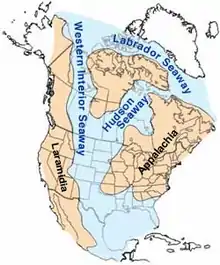Hudson Seaway
The Hudson Seaway was a major seaway of North America during the Cretaceous Period some 75 million years ago. It is named after the Hudson Bay, which currently occupies much of its extent. Although not as extensive as the Western Interior Seaway, which divided North America into eastern and western landmasses (Appalachia and Laramidia, respectively), the Hudson Seaway had major impacts on climate and migration routes by dividing the eastern half of the continent into two (Appalachia and Hudsonia). Greenland was more permanently separated, by the foundered rift that created the Labrador Seaway.

Hudson Seaway
See also
- Lake Agassiz – Large lake in central North America at the end of the last glacial period
 Oceans portal
Oceans portal
References
- Charles Schuchert, 1909. "Paleogeography of North America" Bulletin of the Geological Society of America, Volume 20, 1909, ppg. 472–473. Including plate 49.
- Willis, 1907. Bulletin of the Geological Society of America, Volume 18, 1907, pg. 393.
This article is issued from Wikipedia. The text is licensed under Creative Commons - Attribution - Sharealike. Additional terms may apply for the media files.